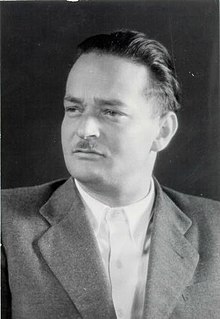Boris Kidrič
| Boris Kidrič | |
|---|---|
 |
|
| Prime Minister of Slovenia | |
|
In office 5 May 1945 – June 1946 |
|
| President | Josip Vidmar |
| Preceded by | Position Established |
| Succeeded by | Miha Marinko |
| Personal details | |
| Born | 10 April 1912 Vienna, Austria |
| Died | 11 April 1953 (aged 41) Belgrade, Yugoslavia |
| Political party | League of Communists |
Boris Kidrič (10 April 1912 – 11 April 1953) was one of the chief organizers of Slovene Partisans, the Slovene resistance against occupation by Nazi Germany and Fascist Italy after the Axis invasion of Yugoslavia in April 1941. He became the de facto leader of the Liberation Front of the Slovenian People. As such, he had a crucial role in the anti-Fascist liberation struggle in Slovenia between 1941 and 1945. After World War II, together with Edvard Kardelj he was a leading Slovenian politician in Titoist Yugoslavia.
Kidrič was born in Vienna, then capital of the Austro-Hungarian Empire, as the son of the prominent Slovene liberal literary critic France Kidrič. In 1953, he died of leukemia in Belgrade.
In the early 1930s, Kidrič was persuaded by the communist publicist Vlado Kozak to join the Communist Party of Yugoslavia. He soon rose to high political posts in the Drava Banovina and was among the founders of the autonomous Communist Party of Slovenia in 1937. Besides Milovan Đilas and Ivan Milutinović, Kidrič was one of the major exponents of the policy of leftist errors.
After the end of World War II, the Slovenian National Liberation Council appointed him as the first president of the Slovenian socialist government and he moved into the Ebenspanger Mansion, which the communist government had confiscated from its previous Jewish owners. He became a member of the Yugoslav Politburo in 1948, and was in charge of the Yugoslav economy from 1946 until his death.
...
Wikipedia
